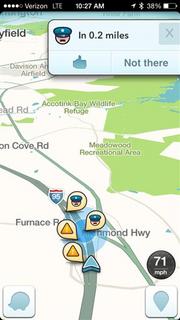You may not have heard of, much less used, the mobile phone GPS app Waze. Waze is a free social GPS app that has turn-by-turn navigation to help drivers avoid traffic. That makes it just like a lot of other smart phone navigation apps. But Waze is different, since it’s also a community-driven application that draws information from other drivers. And it even learns from users’ driving times to provide routing and real-time traffic updates.
Developed by an Israeli start-up, Waze has gained a strong following worldwide. Over 50 million users globally use it. In June 2013, Google acquired Waze for $966 million. The charm is that it makes the auto industry’s dashboard navigation systems obsolete. While auto navigation systems offer beautiful graphics and larger screens, they have their faults. Aside from expensive prices, most of these systems require updating via pre-made DVDs, instead of the Internet. This is far less competitive than real-time updates by apps like Waze. In the case of Waze, the updates are crowd-sourced in near-real time.
One Waze advantage is that it lets users know where police are located along the driver’s route. That feature means that our whiniest the police are far from pleased with that feature of the Waze app. Waze users mark police, who are generally working in public spaces, on maps without much distinction other than “visible” or “hidden.” Users see a police icon, but it’s not immediately clear whether police are there for a speed trap, a sobriety check or a lunch break:
(This screen shot is illustrative, the police could be more than .2 miles away)
That might make you want to download the app right now. But there is trouble in paradise. DailyTECH reports that the Los Angeles PD’s Chief, Charlie Beck, is among a growing contingent of police officers nationwide who claim Waze and its new owner Google, are endangering officer safety by warning people of the location of police. To some in law enforcement, this feature makes Waze a stalking app for people who want to harm police; and they want Google to disable the feature. In a letter sent on Dec. 30, Chief Beck warns Google that the app: (Brackets by DailyTECH)
[The service’s information could be] misused by those with criminal intent to endanger police officers and the community…I am confident your company did not intend the Waze app to be a means to allow those who wish to commit crimes to use the unwitting Waze community as their lookouts for the location of police officers.
There are no known connections between any attack on police and Waze, although the Associated Press reported that Chief Beck said in his letter to Google, that Waze was used in the killing of two New York Police Department officers on Dec. 20. The fact is that Ismaaiyl Brinsley’s (the gunman) Instagram account included a screenshot from Waze along with other messages threatening police.
But, it was impossible for Brinsley to have used Waze to ambush the NYPD officers, since he tossed his cellphone away more than two miles from where he shot the officers.
This is not the first time law enforcement has raised concerns with these types of apps. In 2011, four US Senators asked Apple to remove all applications that alerted users to drunk driving checkpoints. The effort to disable Waze’s police function reminds us of when police tried to give tickets to people who would flash their headlights to warn oncoming drivers of speed traps. Last year, a Missouri Federal Judge decided that it violated the 1st Amendment free speech rights of the people ticketed.
The cop killer argument is hilariously wrong. You could simply look up the address of your local police station and drive nearby if your plan is to kill cops. The honest reason the police are against Waze is because it helps people avoid speeding tickets. You can’t take something that was used once by Ismaaiyl Brinsley and label it a “cop killer” app.
Google isn’t “helping” people break the law. It’s not against the law to tell someone where an officer is. People just want to know where those nasty speed traps are – it doesn’t have to be so complicated! But, if you are caught by one, you can at least be comforted by the thought that there is legal help available to you, should you find yourself facing repercussions.
We already live in a police state. They monitor us dozens of different ways, some of them unconstitutional, like the Stingray devices. But the second someone makes a video recording of an interaction with a cop, or uses an app that indicates their whereabouts, they get all indignant about their privacy and security.
Waze isn’t increasing the exposure of the police force to “cop killers”.


I have to agree with you Wrongologist (that hurt). But there is an underlying issue that your missing. Taxes! If people can avoid the speed-traps, then tickets aren’t issued. No tickets…no revenue for the township. The township then has to raise property taxes to pay for services. If they can’t raise the money then they will go to the state. Then the state will raise taxes or borrow money to cover the costs. So in the end…let the speeders get caught and pay the fine. It is easier on my wallet and most likely yours.
Good Morning Jim, I’m still gonna get the Waze app!
We have one town in Morris County that relies far too much on tickets for revenue. This is always a bad idea. A town should rely on its own tax base, not tickets. Always comes with abuses.